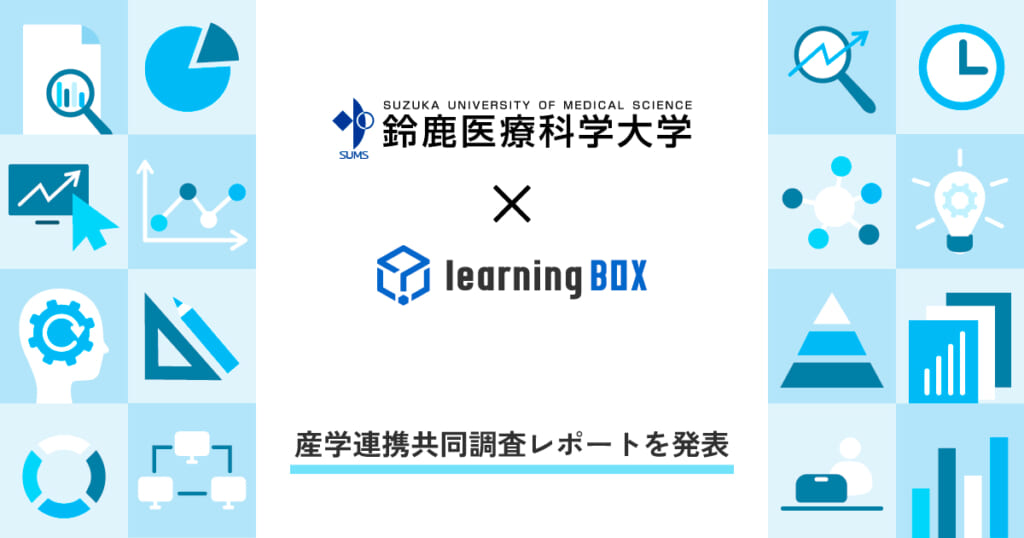
Maintains high national exam pass rate through active use of LMS (Learning Management System). Industry-University Collaboration Joint Research Report Released
Suzuka University of Medical Sciences (Suzuka City, Mie Prefecture; President: Nagayasu Toyoda) and learningBOX, Inc. have published a report summarizing the results of a survey conducted as part of an industry-academia collaboration project. The report is available to the public.
Industry-University Collaboration between Suzuka University of Medical Science and learningBOX
In November 2022, Suzuka University of Medical Science, Japan's first four-year medical university, which has trained specialists for the next generation of Japanese medical and welfare fields, and learningBOX, which develops and operates learningBOX signed a memorandum of understanding on industry-academia cooperation. Under the comprehensive collaboration, the two companies will conduct joint research on new education brought about by EdTech (Education x Technology), including information sharing on the creation of effective teaching materials and mutual proposals for functional improvements.
Past joint research accomplishments include the publication of research reports, the organization of events in Pakistani countries, and the receipt of awards.
▼ Related Releases
Suzuka University of Medical Science and learningBOX Signed MOU on Industry-Academia Collaboration
learningBOX Held "Review Meeting" on e-learning learning in Pakistan
Received the internationally prestigious IMS Japan Award for Excellence
Winner of the 21st Japan e-Learning Awards "Chairman's Award of the National Medical e-Learning Exchange Association" and the 9th 1EdTech Japan Awards "Award of Excellence
Past Survey Reports
Announced in November 2022 ". LMS and its Effects at Medical University」
Announced in June 2024 ".The use of LMS and its effects in medical universities - DX of learning obtained from the Corona Disaster」
Suzuka University of Medical Sciences" has introduced the learning management system "learningBOX" throughout the university since 2020. Even though we were greatly affected by the Corona disaster, we have been actively using "learningBOX" to provide learning support from many angles, including support for students whose proficiency levels are particularly behind. As a result, we have been able to maintain a high pass rate for national examinations, and we are also steadily promoting "DX of Learning" through the use of LMS (Learning Management System).
▼ Related Releases
Maintains a high national exam pass rate even with the Corona Disaster at a medical college.
Joint Research Report
Since the university-wide introduction of "learningBOX" at Suzuka University of Medical Science, both parties have continued to conduct surveys on the operation and use of the "learningBOX" learning management system at Suzuka University of Medical Science. The purpose of this study is to communicate the opinions obtained through daily activities and at the same time to clarify the effectiveness of "learningBOX".
This joint survey report is intended to report on our efforts in FY2024 to further evolve the "DX of Learning" obtained from the Corona Disaster and the results of those efforts.
The passing rate of the national examinations for clinical engineering technicians and radiology technicians in 2024 was 100%. The report also mentions exam preparation in each department, initiatives for students with low proficiency levels, and Suzuka University of Medical Science's commitment to "education until you can do it to the last detail" and "remedial education.
Summary
- Past Initiatives in Industry-Academia Collaboration
- Clinical Engineering and National Examination Pass Rates and Test Preparation
- Department of Radiological Technology and Science, National Examination Pass Rate and Examination Preparation
- Education until tokoton ready/remedial education
- Initiatives for students with low proficiency in each department
- Summary of Survey Results
- Learning management system "learningBOX" in schools and cram schools
Suzuka University of Medical Science
It was the first "four-year medical university" established in Japan in 1991. It was initially a small university with two faculties and four departments, but has now become a "medical and welfare university" with four faculties, eleven departments, and thirteen majors. Based on the founding spirit of "making the progress of science and technology truly useful for the improvement of human welfare and health," the university nurtures specialists in medicine and welfare who combine intelligence and humanity.